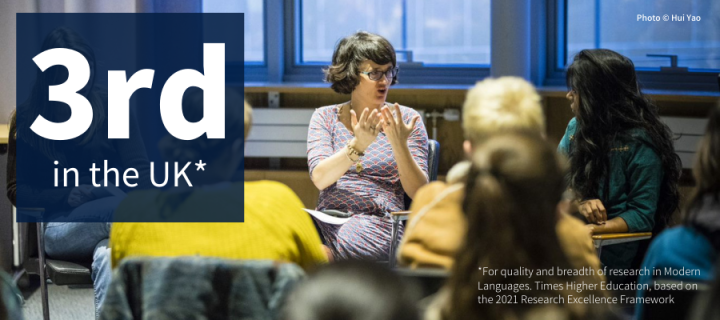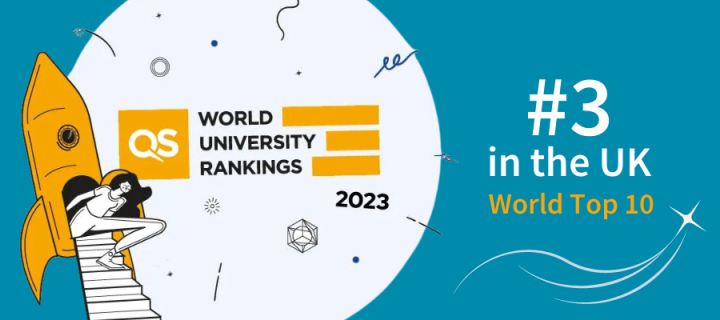Postgraduate study
Choose from a range of programmes, from one-year masters degrees to our PhD in Spanish, Portuguese and Latin American Studies.
What's it like to study here?
Spanish was formally added to the University’s curriculum in 1919 and, in over a century since, has developed into one of the best-established subject areas of its kind in the UK, with teaching and research in Portuguese, Catalan, Spanish and Latin American studies.
We specialise in the major areas of Spanish, Latin American and Lusophone (including Brazil and Lusophone Africa) literary and cultural studies; film and visual culture.
Working with colleagues elsewhere in LLC, and across the wider University, we are able to support research which crosses boundaries between disciplines and/or languages, and we contribute to taught programmes in film, literature, translation studies and intermediality - the relationship between different art forms.
Our graduates tell us that they value LLC’s friendliness, the connections they make here and the in-depth guidance they receive from our staff, who are published experts in their field.
On campus and in the city
We are based in the historic heart of a world-leading festival city, close to the National Library of Scotland and National Museum of Scotland.
The Main University Library is just across the square from us. Its collections include around 27,000 books and 5,000 journals in Spanish and 5,000 books and 2,680 journals in Portuguese.
As part of our postgraduate community, you will be immersed in a world of knowledge exchange, with lots of opportunities to share ideas, learning and creative work.
Activities range from a regular seminar series in European Languages and Cultures (with talks by staff, research students and visiting speakers), to film screenings and workshops, including those organised by the Centre for Contemporary Latin American Studies. Highlights include our annual Cunninghame-Graham Lecture, and our weekly informal Spanish-language reading group ‘Poema de la semana’.
In addition to the summer and winter festivals, Edinburgh has a lively year-round contemporary cultural scene. Its world cinema scene is particularly strong, and we are proud to contribute to this success through the annual Edinburgh Spanish Film Festival and collaborations with Africa in Motion and IberoDocs.
Spain has a consulate in Edinburgh (Portugal an honorary consulate), and there are large communities of Spanish and Portuguese speakers.
Discover more about resources and facilities in Spanish, Portuguese and Latin American Studies
What can I study?
MSc by Research in Spanish, Portuguese & Latin American Studies
A Masters by Research (MScR) programme is ideal if you have a clear idea of the independent research you wish to undertake at masters level. The programme is a good stepping stone to a PhD, but is equally of value as a stand-alone qualification.
As a Masters by Research student, you’ll be part of a wider masters community while specialising in what most interests you right from the beginning of the programme. This is how it is different to a taught Masters (MSc).
Our programme includes 40 credits of training on research skills, methods and problems, the completion of two research assignments, and the submission of a 15,000 word dissertation under the guidance of an experienced and well-published supervisor.
Full-time, one year (all students) ꟾ part-time, two years (eligibility criteria apply)
Find out more and apply on the University of Edinburgh Degree Finder
PhD in Spanish, Portuguese & Latin American Studies
Over the course of your PhD, you’ll complete an original body of work under the expert guidance of at least two supervisors, leading to a dissertation of between 80,000 and 100,000 words. The programme involves training in research skills, methods and problems.
Full-time, three years (all students) ꟾ part-time, six years (eligibility criteria apply)
Before making a formal application to this PhD on the University of Edinburgh Degree Finder, you are strongly advised to read our guidelines on writing a PhD proposal.
Find out more and apply on the University of Edinburgh Degree Finder
Taught masters (MSc) programmes
A number of our School's interdisciplinary taught masters programmes include the option to focus on Spanish, Portuguese and Latin American literature and culture, including in comparison or in translation.
Full-time, one year (all students) ꟾ part-time, two years (selected programmes only - eligibility criteria apply)
Entrance requirements, fees, funding and more...
You can find out about entrance requirements, start dates, fees and scholarship opportunities for all these postgraduate programmes on the University of Edinburgh’s Degree Finder. Degree Finder links straight through to EUCLID, the online system for applying to postgraduate programmes at the University.
Applications to start a programme in September 2024 are now open.
Find out more and apply on the University of Edinburgh Degree Finder
Not sure which programme is right for you?
We're happy to help you decide.
Email us about taught postgraduate study
Email us about postgraduate research
Funding
The range of scholarships open to our students include the Muriel Smith Scholarship (for Masters by Research students) and the John Orr Research Award (for PhD students).
Find out more about funding for postgraduate study
Research Excellence Framework 2021

In the latest Research Excellence Framework (REF 2021), our research was submitted in Modern Languages and Linguistics.
The results reaffirm Edinburgh’s position as one of the UK’s leading research universities - third in the UK based on the quality and breadth of its research in Modern Languages and Linguistics, according to Times Higher Education's REF power ratings.
The Research Excellence Framework is the UK’s system for assessing the quality of research in UK higher education institutions.
Our REF performance recognises that our excellent work has a direct impact both nationally and internationally in politics, business and the third sector.
QS World Rankings by Subject 2023

The University of Edinburgh is ranked 3rd in the UK for Modern Languages.
We are also 3rd in the UK in the broad subject area of Arts & Humanities.
Globally, we’re in the World Top 10 for Modern Languages (7) and Arts & Humanities (10).
The Quacquarelli Symonds (QS) World University Rankings are based on research citations and the results of major global surveys of employers and academics.
They are International Ranking Expert Group (IREG) approved.
Are you currently studying with us?
There’s lots more information for taught and postgraduate research students on our LLC Student Information Hub. You will need your student log in to access the site.

